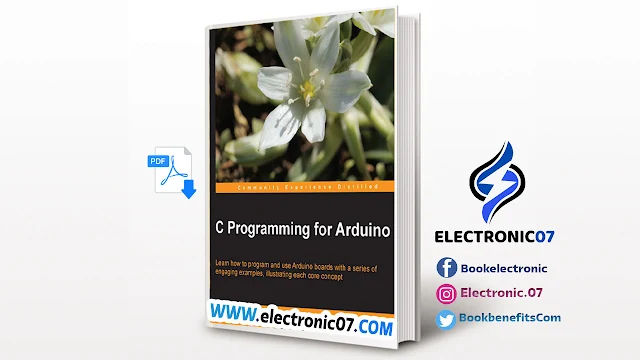C Programming for Arduino: Learn how to program and use Arduino boards with a series of engaging examples, illustrating each core concept PDF
About Of the Book:
In our ever-evolving world of aches and interconnected devices, the possibilities for creating our possess personalized systems seem boundless. The do-it-yourself (DIY) community has forever been captivated by the idea of designing and constructing intelligent systems tailored to particular tasks. From automating lights when someone enters a room to sofas that send emails when Sabbatum upon, inexpensive undefined projects have made it progressively easier to bring these ideas to life. The credit for this rotation goes to the Arduino project, initiated in 2005 in Ivrea, Italy. Arduino has become one of the most widely used open-source hardware platforms globally, empowering users to make their own undefined with ease.
"C Programming for Arduino" is a comprehensive book authored by Julien Bayle, that aims to as a definitive guide for scheduling and utilizing Arduino boards. premeditated in the first place for beginners with little or No prior experience in programming or electronics, this book equips readers with the fundamental knowledge required to embark on their Arduino journey.
The book delves into the basics of the C programming language, offering step-by-step instructions on how to utilize Arduino boards effectively in various projects. from each core concept is reinforced through engaging examples, ensuring a practical and interactive encyclopaedism experience. Let's take a look at some of the key topics covered within the book:
Getting started with Arduino: Readers are introduced to the Arduino platform, its capabilities, and how to typeset it upward for use.
Basic programming concepts: The book covers fundamental programming concepts such as variables, data types, and verify structures, providing a solid-state foundation for building more complex projects.
Input and output operations: Exploring the employment of integer and analog pins, readers learn how to interact with the natural science world by connecting sensors and actuators.
Working with sensors and actuators: The book guides readers on effectively integrating various sensors and actuators to create sensitive and interactive projects.
Communication with unusual devices: sympathy the essentials of serial communication enables readers to find seamless connections between Arduino boards and undefined devices.
Creating exploiter interfaces: Readers learn how to design user-friendly interfaces using LCDs and buttons, enhancing the overall interactivity of their projects.
Extending functionality with libraries: The book introduces the utilization of libraries, enabling users to expand Arduino's capabilities and purchase existing code.
"C programming for Arduino" serves as a valuable resource for individuals aspiring to learn the art of scheduling and utilizing Arduino boards. The reserve is exceptionally well-written, ensuring lucidness and comprehension for readers of all levels. Abundant examples and exercises are provided to reinforce understanding and encourage hands-on practice.
Furthermore, the reserve takes a holistic approach by delving into additional fields of knowledge. Readers are exposed to fundamental interaction design principles, real-time multimedia frameworks such as Processing, and the Max 6 graphical scheduling framework. These additional insights extend readers' perspectives, allowing them to explore input and output concepts, undefined networking, sound synthesis, and reactive systems design.
By taking hold of the concepts shared in "C Programming for Arduino," readers acquire the necessary skills to embark on their journey as makers. This knowledge empowers individuals to perceive the modern earthly concern not only as passive users but as active creators and innovators. The book encourages the renowned "learning-by-making" approach, which has been a cornerstone in Julien Bayle's courses, spanning Max 6, Processing, and Ableton Live.
"C Programming for Arduino" presents a gateway to the fascinating world of Arduino, sanctionative individuals to plan and prepare their own ironware projects. Through its comprehensive coverage of C/C++ programming and hands-on examples, readers gain the skills and confidence requisite to navigate the realm of Arduino. Armed with this knowledge, they can embark on a transformative journey of exploration, innovation, and creation in the ever-evolving landscape of wired devices.
Contents Of the Book:
Chapter 1: Let's Plug Things.
Chapter 2: First Contact with C.
Chapter 3: C Basics – Making You Stronger.
Chapter 4: Improve Programming with Functions, Math, And Timing.
Chapter 5: Sensing with Digital Inputs.
Chapter 6: Sensing the World – Feeling with Analog Inputs.
Chapter 7: Talking Over Serial.
Chapter 8: Designing Visual Output Feedback.
Chapter 9: Making Things Move and Creating Sounds.
Chapter 10: Some Advanced Techniques.
Chapter 11: Networking.
Chapter 12: Playing with the Max 6 Framework.
Chapter 13: Improving Your C Programming and Creating Libraries.
Information Of the Book:
Title: C Programming for Arduino.
Language: English.
Size: 11.1 Mb.
Pages: 512
Format: PDF
Year: 2013.
Edition: 1.
Author: Julien Bayle.

